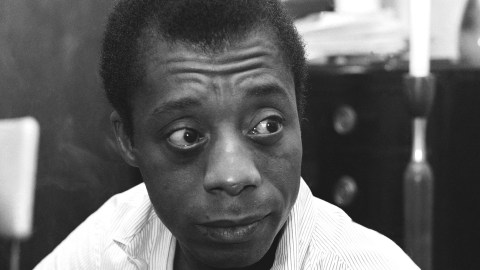Why We Still Badly Need James Baldwin

“It is a sentimental error, therefore, to believe that the past is dead; it means nothing to say that it is all forgotten, that the Negro himself has forgotten it. It is not a question of memory. Oedipus did not remember the thongs that bound his feet; nevertheless the marks they left testified to that doom toward which his feet were leading him. The man does not remember the hand that struck him, the darkness that frightened him, as a child; nevertheless, the hand and the darkness remain with him, indivisible from himself forever, part of the passion that drives him wherever he thinks to take flight.” —James Baldwin, “Many Thousands Gone”
Black History Month is over; black history isn’t. One of the best ways to honor that fact is to read James Baldwin—and why not in March instead of February?
Though certainly remembered and admired, Baldwin seems to me, relative to the scale of his achievement, one of the more undervalued figures in both black and literary history. Novelist, short story writer, essayist, black man and gay man in midcentury America, he is simultaneously a master of brutal directness and of what he called the “high element of the ironic” in black American life. As an essayist he’s our Orwell, a teller of scorching truths, except that not even Orwell can quite match the intensity of his prophetic fire.
Though he considered himself primarily a fiction writer, I tend to prefer his nonfiction, which offers the gripping quality of great narrative while allowing his explicit moralism free rein. Raised by an abusive, paranoid Harlem preacher, Baldwin became (like Emerson in the previous century) a minister himself before leaving the church for a literary career. His essays are secular sermons in which he battles his stepfather’s fatalism:
He had lived and died in an intolerable bitterness of spirit and it frightened me, as we drove him to the graveyard through those unquiet, ruined streets, to see how powerful and overflowing this bitterness could be and to realize that this bitterness now was mine. —“Notes of a Native Son”
I admire particularly those essays collected in Notes of a Native Son, a volume whose publication date, 1955, is discouraging to consider. So accurately does Baldwin diagnose our present-day racial neuroses that you can read him for long passages before encountering some slight anachronism—a reference to interracial marriage laws, say—that jolts you with the recognition of time elapsed, and lost. No great writer ever goes obsolete, but you wish Baldwin had become less relevant than he is.
Baldwin knows that the history of racism in America is a history of shame:
Time has made some changes in the Negro face. Nothing has succeeded in making it exactly like our own, though the general desire seems to be to make it blank if one cannot make it white. When it has become blank, the past as thoroughly washed from the black face as it has been from ours, our guilt will be finished—at least it will have ceased to be visible, which we imagine to be much the same thing. But, paradoxically, it is we who prevent this from happening; since it is we, who, every hour that we live, reinvest the black face with our guilt; and we do this—by a further paradox, no less ferocious—helplessly, passionately, out of an unrealized need to suffer absolution. —“Many Thousands Gone”
Note that he is willing, where necessary, to take the rhetorical tack of speaking on behalf of majority (i.e., white) America. In doing so he acts as that majority’s conscience. Were he to visit our present-day country—with its persistent legal and hiring discrimination against minorities (all unspoken, of course; perhaps by now largely unconscious); its reluctance, in some quarters, to accept the legitimacy of its first black president; its compulsive need, even in liberal Hollywood, to whitewash black history—I don’t think he’d find an America able to look him squarely in the eye.
Anyone who views white guilt as mere squeamishness, or as a demon finally exorcised with the election of Obama, should read “The Caging of America,” Adam Gopnik’s recent New Yorker essay on American prisons. Gopnik rightly notes that “the scale and the brutality of our prisons are the moral scandal of American life.” Noting how overwhelmingly many of our prisoners are black—and how many of them were convicted due to unnecessary drug laws, unequally enforced—Gopnik makes the case that our jails are latter-day incarnations of Jim Crow, if not the plantation:*
“More than half of all black men without a high-school diploma go to prison at some time in their lives. Mass incarceration on a scale almost unexampled in human history is a fundamental fact of our country today—perhaps the fundamental fact, as slavery was the fundamental fact of 1850. In truth, there are more black men in the grip of the criminal-justice system—in prison, on probation, or on parole—than were in slavery then.”
In other words, our society’s guilt remains real, and rather than reckon with it we’ve tried again to evade it by changing the nature of our crime. Baldwin wrote that “a ghetto can be improved in only one way: out of existence”; white America has opted instead to turn prisons into more lucrative and efficient ghettoes.
Gopnik argues that ending this scandal won’t require any grand social changes, only “the intercession of a thousand smaller sanities”—for example, marijuana decriminalization. I hope he’s right, but something tells me more is called for. It couldn’t possibly hurt, in any case, for public figures to show some passion about this issue. In a celebrated 2008 speech, then-candidate Obama called for a national conversation on the topic of race. Is it too much to hope that someone in power will revive this initiative, and that the scandal of our prisons will be the first taboo confronted?
I would wish that Baldwin himself were still around to conscience us, but frankly, the man’s dead, he deserves a rest, and his work is enough. His prose provides ample ammunition against the vestiges of bigotry as well as a model of craftsmanship. The first essay in Notes concludes, “I want to be an honest man and a good writer,” and the back-cover bio on my Beacon Press edition reads, “James Baldwin (1924–1987) was one of America’s foremost writers”—a wonderful instance of a book standing as monument to a life.
*For more, see Michelle Alexander’s The New Jim Crow: Mass Incarceration in the Age of Colorblindness (2010), which Gopnik draws on and which is regarded as the central study of the subject.





